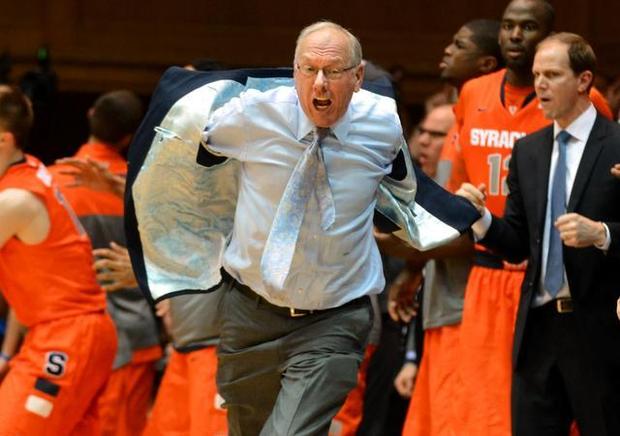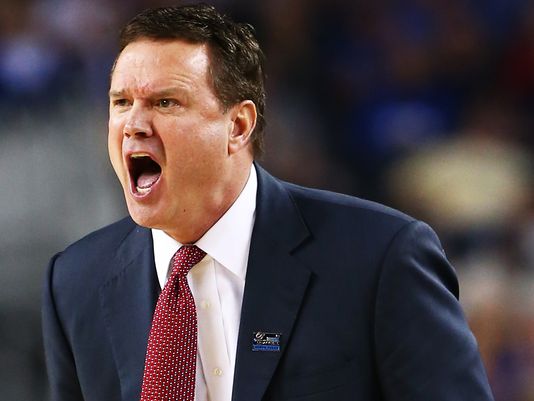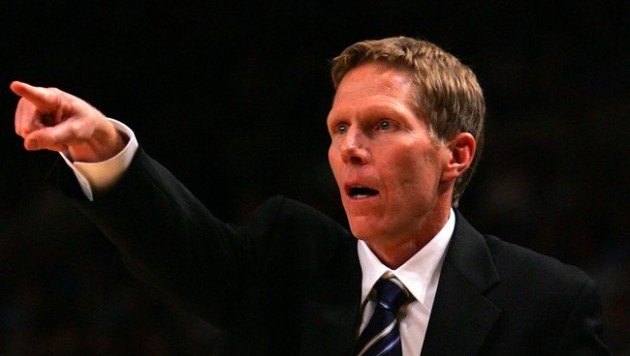In a discussion of unfairly criticized and excessively admired college basketball coaches, which names would first enter your mind?
The Student Section’s basketball writers and managing editor Matt Zemek explore these two topics in our latest season preview roundtable. The season tips off on Friday with the all-Pitino clash between Minnesota and Louisville. On Monday night, ESPN’s 24-hour marathon begins with SMU-Gonzaga.
Speaking of Gonzaga…
*
Question 1: Which coach in college basketball gets the largest amount of credit for the smallest body of actual achievement?
Steve Fetch:
On Twitter @13fetch
I almost don’t want to answer this because I don’t like singling guys out, but it’s probably Mark Few. Winning in the regular season is more indicative that you’re a good coach than winning in the tournament, but that equation is tilted a bit differently at a school like Gonzaga. When you’re getting the recruits that he gets, you’re supposed to dominate your league every year. It’s time to translate that into March success.
Scott King:
On Twitter @BearcatsBlog
Mark Few. To steal a line from the Solid Verbal, what’s your favorite Gonzaga second-round win from the last five years? It’s hard as hell to win at Gonzaga, and it’s pretty remarkable when you think about it that it is a national power. With such power, though, comes a responsibility to win. The Bulldogs haven’t won when it’s mattered most. Fairly seeded, unfairly seeded, none of it has mattered. Is Mark Few a very good coach? Yes. Is he a great coach? I wouldn’t go that far. Great coaches have an Elite 8 appearance.
*

If you claim that Jim Boeheim is overrated, you’ll get THIS kind of reaction from many Syracuse fans. Yet, it seems that, at least to TSS managing editor Matt Zemek, Boeheim is automatically and breathlessly accorded the status of a legend without being knocked for a few persistent and conspicuous failures. All coaches fail conspicuously in March, but Boeheim has done so to a greater extent than a number of other Hall of Fame coaches. Should that discussion be swept under the rug? No.
Matt Zemek:
On Twitter @SectionMZ
Syracuse fans are sure to go ballistic here, but the best non-Mark Few answer is Jim Boeheim.
Let me be clear: Boeheim is a very good coach. Moreover, it’s well-nigh impossible to deny him a rightful spot in the Basketball Hall of Fame. You don’t last nearly 40 years at one power-conference school if you’re not extremely good at what you do. You don’t attain the longevity Boeheim has found in a cutthroat business if you can’t adjust to changing circumstances. You don’t preside over a sustained winner in college basketball if you can’t relate to players and can’t inspire them to be at their best. Boeheim is a really, really good coach.
Is he great, though? It’s an allowable answer — I certainly won’t say “You’re wrong!” if you advanced the claim. However, I’ve never felt wowed by Boeheim as a coach, and no, it’s not because he uses a zone defense.
There’s a very simple statistic attached to Boeheim’s career, one that other coaches with similar levels of longevity and stature in the business generally lack: Boeheim, in nearly 40 years at Syracuse, has never made the Final Four as a No. 1 seed. His 1987 team was a strong 2 seed, one good enough to take down Dean Smith and North Carolina in a big-boy Elite Eight game, but other than that squad, Boeheim has never, EVER been able to take a heavyweight team to the promised land. You might find another coach with that void on a Hall of Fame resume, but you’d have to look very hard (maybe another obvious example exists under my nose, and I just have been ignoring it all these years; you’re free to set me straight).
Is Boeheim a deserving Hall of Fame coach? Yes. Yet, there’s always a Hall of Famer in a sport who somehow inspires less-than-complete amazement, and as far as college basketball coaches are concerned, Jimmy B. is that guy.
*
Question 2: Which coach gets the least amount of credit for the largest body of actual achievement?
Matt Zemek:
Jamie Dixon has not made a Final Four, so there is certainly a horizon he hasn’t yet reached. His career isn’t entirely fulfilled — in the realm of the power conferences or at any program which gaines brand-name status, no coach’s career gains wholeness until that Final Four appearance greets the resume. To this extent, there’s still a gaping void in Dixon’s overall profile.
However, after Ben Howland quickly breathed life into the Pittsburgh program with a pair of Sweet 16 appearances in 2002 and 2003, it was hardly a slam dunk that Dixon was going to keep the train rolling. This was Pittsburgh, not Georgetown. This was Pittsburgh, not Syracuse. this was Pittsburgh, not Connecticut. A program without a history of sustained success needed to show that… it could sustain success.
Dixon has done this better than anyone could have reasonably expected.
Does he have problems in endgame situations? Most definitely. The loss at North Carolina last season was brutal, and it has to be said that in recent years, the Panthers have — on a larger level — lost some of the starch they had in the Levance Fields/DeJuan Blair/Sam Young days. Yet, for all that was wrong with Pittsburgh last season, the Panthers crushed Colorado in the NCAA tournament and did not embarrass themselves at all against Florida in the round of 32. Even in a relatively uninspiring season, Pittsburgh won an NCAA game.
This isn’t a brand-name program, and yet, in an ACC which has added Syracuse and now Louisville as well, it is still expected that Pitt will — and should — make the NCAA tournament every year. The program has, in fact, reached the Big Dance in every season but one under Dixon. The Panthers reached the Elite Eight and were simply beaten on a brilliant play by Scottie Reynolds of Villanova (2009). The Panthers had a Final Four contender in 2011 but lost a classic tournament game to Butler, partly because of a foul on a free throw, something which should not fall on a coach’s shoulders.
Many esteemed coaches — Steve mentioned Bill Self, and there are dozens of other examples from the past — just don’t get the right breaks in March. It’s true that a coach ought to break through at some point — that claim owns some weight and should be acknowledged as a strong and convincing argument against Dixon. However, when the regular-season body of work is so thoroughly impressive year after year after year, fierce criticism needs to be held in check.
Self winning the Big 12 for 38,937 consecutive years should mute the criticism which inevitably emerges after the latest March flameout at Kansas. Since Pittsburgh is not Kansas, making the Dance in 10 of 11 seasons — though not the same as winning the Big 12 title every year — should be seen as a special accomplishment, one which a lot of average coaches could only dream about. Making Pittsburgh an annual winner after Ben Howland put the foundation in place is similar to Bo Ryan becoming a relentlessly consistent winner at Wisconsin after Dick Bennett set the program on the right path.
Bo Ryan got his first Final Four last season after many years of failing to conquer the March demon. Dixon isn’t as good as Ryan, but he’s certainly a lot better than 90 percent of coaches out there. Yet, few coaches get pounded as mercilessly whenever something bad happens to Pittsburgh. Most of the people in the coaching profession would love to trade places with Jamie Dixon’s career resume — they’d do so in a heartbeat. We should all own Dixon’s shortcomings; they’re college basketball versions of “First World Problems.”
*

Will Bill Self ever fail to win the Big 12 regular season championship? When a coach performs that consistently, March can become a less central basis for evaluating his overall job performance. Yes, a slightly better track record in future NCAA tournaments wouldn’t hurt, but Self is easily one of the five best coaches in the sport today. He’s very likely in the top three. If you want to criticize a coach for March performance, you wouldn’t start with Self. You’d need to identify dozens of other bench bosses first. Self would stand in the back of the line.
Steve Fetch:
I’m a Kansas fan so I probably shouldn’t launch into a 10,000-word opus about Bill Self, but here goes: he’s won 10 straight conference titles, he has fewer losses in Allen Fieldhouse than national titles, has been to two title games (winning one of them), and all of that gets wiped away by some bad luck in the NCAA tournament. Other than the Northern Iowa loss, it’s pretty easy to explain them all away as flukes. Obviously after it happens more than a couple times it becomes an issue, but, just for example, I don’t think it’s his fault that Joel Embiid got hurt and had to miss the Stanford game.
Scott King:
Lon Kruger. All he does is win. Oklahoma was down when he took the job, but now they are coming off back to back 20 win seasons and an NCAA bid. OU could be a player in the Big 12 race this year. They definitely should be a tournament team. Since turning around UNLV, Kruger has gotten results.

